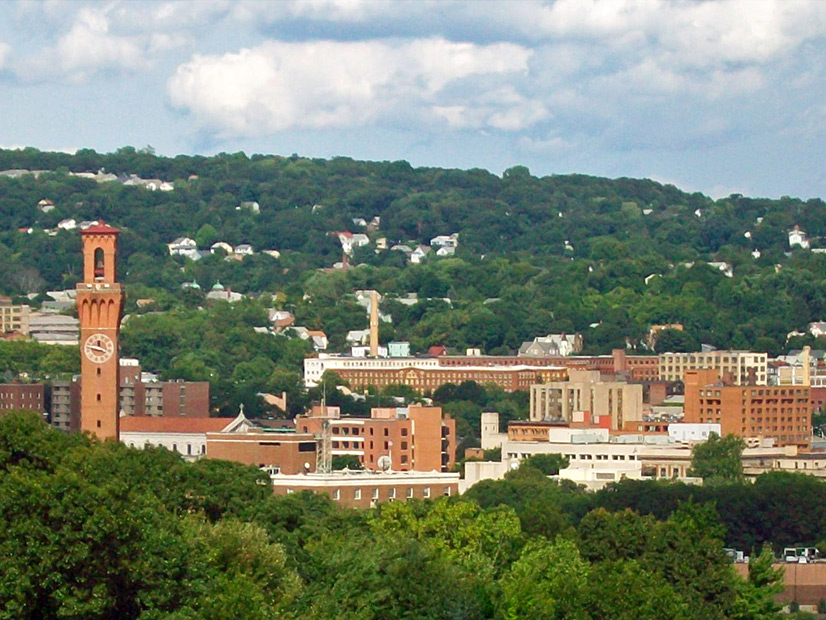
Connecticut’s five biggest cities — Bridgeport, Hartford, New Haven, Stamford and Waterbury — each contain about 600 pollution sources, according to the state’s Department of Energy and Environmental Protection. They’re also home to 51% of the state’s impoverished residents and 71% of its communities of color.
State Rep. Geraldo Reyes (D) this year tried to address those issues by co-sponsoring a bill on environmental justice and racism during the Connecticut General Assembly’s regular session. The bill would have protected “distressed municipalities from new sources of pollution while reducing existing sources of pollution for such areas of the state.”
The legislation did not advance out of committee. Reyes proposed it after helping to revise the state’s environmental justice regulations in a special session last fall. The state now requires facilities impacting the environment to improve communication with “environmental justice communities” located in census blocks where 30% of the population are low-income individuals or communities defined as “distressed.” These actions put Reyes squarely on the frontline of environmental justice, not only in his hometown of Waterbury but statewide.
“Although I’m no stranger to the environmental justice conversation … I’ve taken on the environmental challenges simply because I did not like what I saw around in my neighborhood, as it was affecting the quality of air and the quality of life in the south end of Waterbury,” Reyes said at a recent Connecticut Green Bank webinar on the “History of Environmental Justice in America and the Frontlines of Climate Justice Today in Connecticut.”
Once known as America’s “Brass City,” Waterbury is now better known for poor air quality and high asthma rates, including among Reyes’ family, he said. And while progress is being made on the environmental justice front through legislation, Reyes said there is “a long way to go.”
Reyes said it was a “struggle” for him when the environmental justice and racism bill did not advance out of committee, because he wants to “get to the end result.” Legislating is a marathon, not a sprint, he said.
“I want to put the perfect bill out there, but when you’re working across aisles and negotiating, you may not be able to get the perfect bill in one shot.”
Inclusion Needed
While environmental justice might primarily focus on air quality and other ecological aspects, it also can deal with energy affordability and burden, said Brenda Watson, executive director of the nonprofit Operation Fuel. It also serves as an entry point into climate justice.
“There’s a huge role that utility companies and regulators play, as well as advocates, and we all need to be at the planning table together,” Watson said. “For a long time, regulators and investor-owned utilities have been shaping energy policy and regulation from the top down, and what we should be doing is planning from the top down as well as bottom up.”
Infrastructure and weatherization can help reduce energy burden and address public health and climate change, Watson said. She said that environmental justice and energy affordability advocates alike realized that weatherization is critical to addressing climate change.
“If we’re not shoring up infrastructure for the many households who can’t afford to invest in renewable energy products like solar battery storage, heat pumps and fuel cells when those become available on a wide scale, we’re going to continue to be on this cycle of perpetuating the harm.”
In June, Gov. Ned Lamont (D) signed into law legislation that requires clean energy projects pay prevailing wages, despite vehement opposition from solar industry trade groups, which said the state should not apply rules governing the level of wages and benefits usually reserved for publicly financed projects.
John Harrity, chair of the Connecticut Roundtable on Climate and Jobs, said the law was “not a union worker bill.” Instead, he said, it urges renewable energy project developers to have apprenticeships and pre-apprenticeship programs aimed at communities of color where people who have been disenfranchised “get something out of it” and break the cycle of “promises made and promises broken.”
“If green jobs are allowed to become a kind of a Walmart, no-benefit type job, then workers will resist addressing climate,” Harrity said. “We need to make this an inclusive effort that brings people in where we all share in that prosperity because we are definitely going to be asked to make sacrifices, and this should be an equitable situation.”


